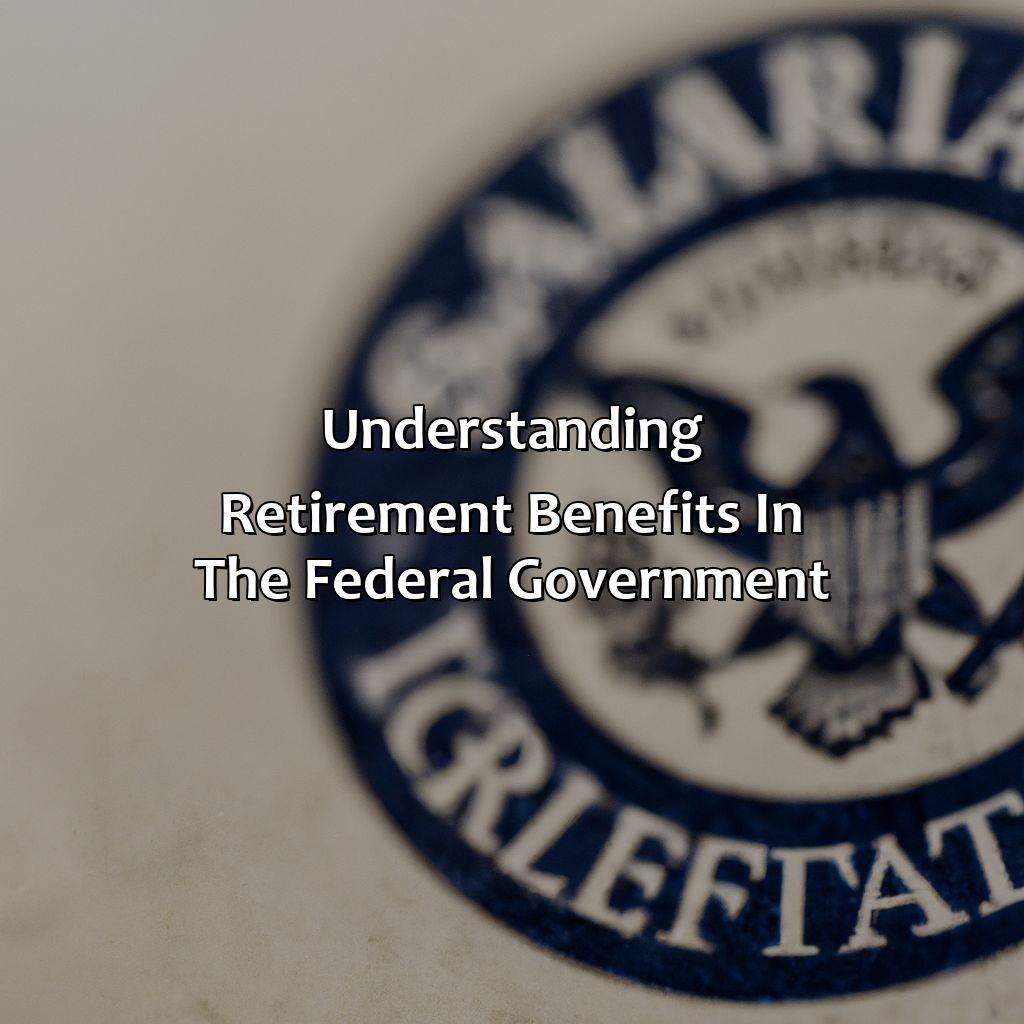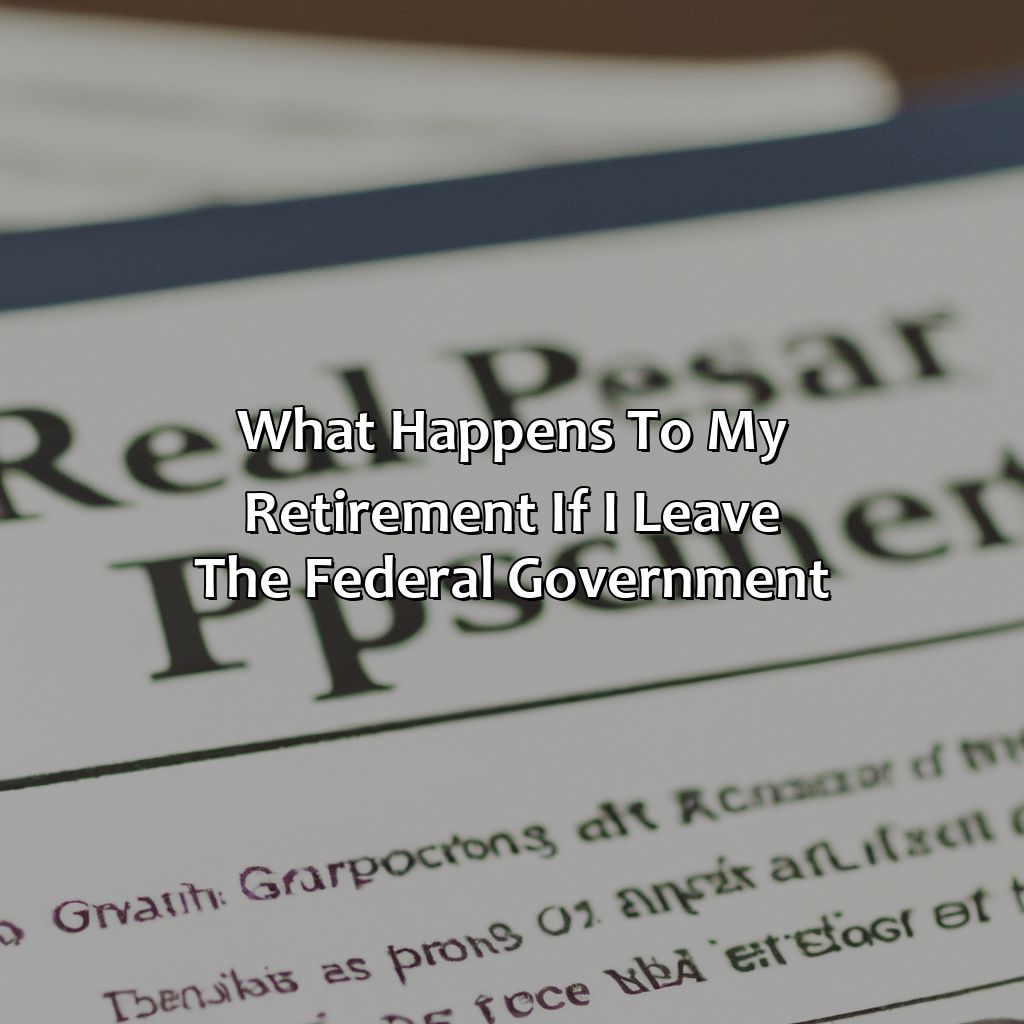What Happens To My Retirement If I Leave The Federal Government?
Key Takeaway:
- Leaving the federal government affects retirement benefits: When leaving the federal government, retirement benefits can be impacted, including your Federal Employee Retirement System (FERS), Civil Service Retirement System (CSRS), and Thrift Savings Plan (TSP).
- Options for retirement planning: If leaving the federal government, consider rolling over your TSP account, exploring annuities and managed accounts, and understanding health insurance benefits to properly plan for retirement.
- It’s important to understand your retirement benefits: Understanding the consequences of leaving the federal government and exploring retirement planning options can ensure a stable and comfortable retirement.
Worried about leaving your federal job and losing your retirement? You’re not alone. But don’t fear – this article will explain what you need to know about preserving your retirement savings! Get ready to learn about the different options available when you leave the federal government.
Understanding Retirement Benefits in the Federal Government
Understanding Retirement Benefits in the Federal Government can be a complicated process for those who are looking to leave their government jobs. Leaving the federal government has powerful implications for one’s retirement plan. As a result, it is important to understand how leaving the federal government affects your retirement benefits. Employers aim to retain valuable employees by offering a generous benefits program, yet this program is associated with provisions that vary from job to job.
If you leave the federal government, your retirement benefits may be drastically altered depending on the type of retirement plan you had and the amount of time you spent in the government. The federal government has several retirement programs that employees can choose from, and these programs offer different options for retirement benefits. For example, the Federal Employees Retirement System (FERS) offers a basic annuity, which is fixed payments that continue throughout your retirement, in addition to its Social Security coverage and defined 401(k)-style contribution plan. Moreover, the Civil Service Retirement System (CSRS) is only available to employees hired before 1984, but it provides a more comprehensive pension plan.
It is critical that you know your rights when leaving the federal government to ensure you do not lose any additional benefits you could be entitled to. For example, you could be eligible for an unpaid percentage of the FERS annuity balance if you decided to leave your job. Furthermore, there may be additional benefits that can impact your retirement in the long run.
In 2014, Congress passed the Digital Accountability and Transparency Act (DATA Act), which required the Office of Personnel Management (OPM) to begin reporting and publicizing how much money is being spent on government employee benefits, including pensions. In addition to providing transparency, this act can help government employees better understand their benefits and prepare for retirement.
Understanding Retirement Benefits in the Federal Government is crucial when contemplating leaving your job or preparing for retirement. With the proper knowledge, you can guarantee that you will receive your retirement funds and ensure that you are not leaving anything behind.

Image credits: retiregenz.com by Joel Arnold
The Consequences of Leaving the Federal Government
When Leaving the Federal Government: A Look at Retirement Implications
Leaving the federal government without careful consideration of retirement implications can lead to potential financial consequences.
Upon leaving, your retirement benefits will depend on your length of service, vesting status, and retirement plan. If you have completed at least five years of creditable service and are vested, you may be eligible for a deferred annuity, which will become payable at age 62.
Moreover, if you are retiring under the Federal Employees Retirement System (FERS), you will not be eligible to receive your Thrift Savings Plan (TSP) contributions until you reach age 59 and a half. Thus, you may need to consider rolling over your TSP account to avoid penalties and taxes.
It is important to note that if you leave the federal government before reaching the minimum retirement age, you will not be able to immediately start receiving benefits, which can affect your retirement income. This highlights the significance of planning for your retirement well in advance, to ensure you are adequately prepared.
A real-life example is the story of John, who worked for the federal government for 11 years before leaving to pursue his passion of entrepreneurship. He did not take into account the impact of his decision on his retirement benefits. As a result, he faced a significant decrease in his expected retirement income, causing him to rethink his decision.

Image credits: retiregenz.com by Harry Arnold
Options for Retirements Planning if Leaving the Federal Government
In the event of leaving the federal government, what are the available choices for retirement planning?
Retirement choices if leaving the federal government include withdrawals, individual retirement accounts, annuities, rollovers, and deferred annuities.
Withdrawals, which require total amount taxes, will yield immediate cash; IRAs allow flexibility of tax at distributions; annuities ensure lifetime payment; rollovers qualify for penalty-free rolling over; and deferred annuities allow beneficiaries protection of future payments.
A critical point to remember is that time works tirelessly, and having a solid plan can make all the difference.
Pro Tip: begin to develop a plan before retirement to maximize your options and ensure the smoothest transition possible.

Image credits: retiregenz.com by Adam Arnold
Five Facts About What Happens to My Retirement If I Leave the Federal Government:
- ✅ If you leave the federal government before reaching retirement age, you may be able to withdraw contributions made to your retirement fund, but you will not be eligible to receive any government-provided retirement benefits. (Source: Office of Personnel Management)
- ✅ You may be able to transfer the funds in your Thrift Savings Plan (TSP) to another qualified retirement account if you leave federal service. (Source: TSP.gov)
- ✅ If you leave federal service with at least five years of creditable service, you may be eligible for deferred retirement benefits, which would provide retirement benefits at a later date. (Source: Office of Personnel Management)
- ✅ Your length of service and age at the time of departure will have an impact on how much retirement benefits you may be eligible to receive in the future. (Source: The Balance)
- ✅ It is important to carefully consider the implications of leaving federal service on your retirement benefits before making a decision to leave. (Source: U.S. News & World Report)
FAQs about What Happens To My Retirement If I Leave The Federal Government?
What happens to my retirement if I leave the federal government?
If you leave the federal government before you are eligible for retirement benefits, you may be able to withdraw your contributions to the retirement fund. However, if you do this, you will lose any future retirement benefits from that fund. Alternatively, you can choose to leave your contributions in the fund and potentially be eligible for retirement benefits in the future.
Can I transfer my retirement benefits to a different employer?
If you leave the federal government, you may be eligible to transfer your retirement benefits to a new employer’s retirement plan. However, this depends on the rules of your new employer’s plan. You may also be able to roll over the funds into an Individual Retirement Account (IRA).
What happens to my unused sick leave if I leave the federal government?
If you have unused sick leave when you leave the federal government, it will be converted into service credit and added to your retirement account. This can increase your retirement benefits.
What is the Federal Employees Retirement System (FERS)?
The Federal Employees Retirement System (FERS) is the retirement system used for most federal employees who began working after 1983. It is a three-part system consisting of a basic pension, Social Security benefits, and a Thrift Savings Plan (TSP).
What is the Thrift Savings Plan (TSP)?
The Thrift Savings Plan (TSP) is a retirement savings and investment plan for federal employees. It is similar to a 401(k) plan in the private sector and allows employees to save pre-tax money from their paychecks for retirement. The federal government may also make contributions to the plan on behalf of employees, and there are various investment options to choose from.
How do I calculate my federal retirement benefits?
Your federal retirement benefits are calculated based on your years of service, high-three average salary, and the percentage multiplier for your retirement plan (either FERS or Civil Service Retirement System). You can use the online retirement calculator on the Office of Personnel Management website to estimate your benefits.




